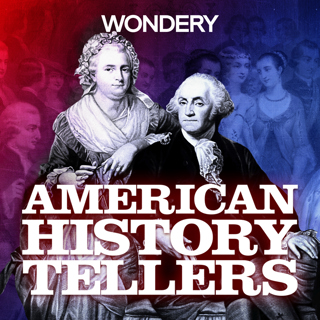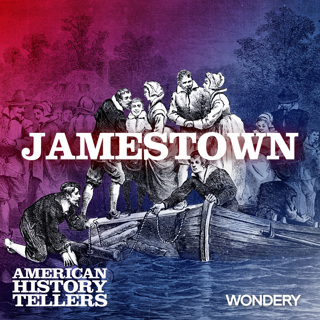
Tulsa Race Massacre - Legacy and Lessons | 5
Nearly a century after a white mob leveled the affluent Tulsa district known as Black Wall Street, how is Greenwood faring? Mechelle Brown is the program coordinator for the Greenwood Cultural Center, which seeks to educate people about the rich history of the Greenwood District. She joins us to discuss why a race conflict in Tulsa was inevitable, the city’s ongoing struggle to fully acknowledge the history of the massacre, and what has — and still hasn’t — been done. Support us by supporting our sponsors!See Privacy Policy at https://art19.com/privacy and California Privacy Notice at https://art19.com/privacy#do-not-sell-my-info.
26 Juni 201934min

Tulsa Race Massacre - Rebirth | 4
On June 2, 1921, thousands of black Tulsans interned at the Tulsa Fairgrounds woke under armed guard. Many had no idea where their loved ones were or if they were still alive; they didn’t know whether their homes were still standing or if they’d been ransacked by the white mob. As Greenwood residents worked to restart lives that had been violently interrupted, sympathy for the survivors exploded around the country. In Tulsa, some white business leaders vowed to help them rebuild. But city officials and greedy real estate speculators had other ideas—ideas that would push Greenwood residents off their valuable land forever.But those white elites would fail to account for the ambition, leadership and tight bonds of community that Greenwood’s people had built over the years. What followed was one of the most astonishing displays of African American resilience in the 20th century. Against all odds, Black Wall Street would rise from the ashes.If you’d like to learn more about the Tulsa Race Massacre, we recommend a few great books we drew on for this series:Black Wall Street: From Riot to Renaissance in Tulsa’s Historic Greenwood District by Hannibal JohnsonReconstructing the Dreamland: The Tulsa Riot of 1921 by Alfred BrophyRiot and Remembrance by James S. HirschSupport us by supporting our sponsors!See Privacy Policy at https://art19.com/privacy and California Privacy Notice at https://art19.com/privacy#do-not-sell-my-info.
19 Juni 201948min

Tulsa Race Massacre - The Invasion | 3
By midnight on Tuesday, May 31, 1921, some Greenwood residents assumed the riot was calming down. Many families, far away from the action at the courthouse, hadn’t even heard about the violence, and went to bed as usual. But as much of the city slumbered, the white mob was transforming into something even more deadly: a highly organized, strategic force led by volunteer soldiers.That force held its fire until daybreak on Wednesday, June 1, when it sprang into action. All over Greenwood, men, women and children found themselves under siege, their homes, businesses and churches under attack from land and sky. Greenwood’s proud residents would defend themselves until they could defend themselves no more — calling the very survival of their fabled community into question.Support us by supporting our sponsors!See Privacy Policy at https://art19.com/privacy and California Privacy Notice at https://art19.com/privacy#do-not-sell-my-info.
12 Juni 201940min

Tulsa Race Massacre - The Powder Keg | 2
As Dick Rowland sat in a jail cell at the Tulsa courthouse on Tuesday, the news of his arrest and rumors about his alleged rape of Sarah Page flew through town. Egged on by an inflammatory op-ed in the Tulsa Tribune, a white mob bent on a lynching began assembling outside the courthouse. By that evening, the crowd of hundreds had swelled to thousands. Meanwhile in the office of the Tulsa Star newspaper, Greenwood’s most prominent citizens debated the proper course of action. Some young veterans of the recent world war were determined to defend Rowland, with their lives if necessary, while older, cooler heads urged caution and restraint.Both sides would gather at the courthouse Tuesday night, armed with their fists, guns and moonshine. Anything — or anyone — could set them off.Support us by supporting our sponsors!See Privacy Policy at https://art19.com/privacy and California Privacy Notice at https://art19.com/privacy#do-not-sell-my-info.
5 Juni 201939min

Tulsa Race Massacre - The Promised Land | 1
Between 1838 and 1890, thousands of African Americans moved to Oklahoma, brought there as Cherokee slaves or drawn there by the promise of free land. Black pioneers established towns where African Americans could govern themselves and thrive in community together, and in time, Oklahoma became known as “The Promised Land” of freedom, dignity, and economic self-sufficiency. Out of this movement, the wealthiest African American community in the nation was born. By 1921, the Tulsa neighborhood of Greenwood had become such a hotspot of entrepreneurship that it became famous as “Negro Wall Street.”But the Greenwood community lived uneasily in the racist, corrupt, lawless oil boomtown of Tulsa. On a hot May day in 1921, a young shoeshine boy would step into an elevator with a teenage white girl and accidentally spark the worst incident of racial violence in America -- a massacre that would be kept secret for decades.Support us by supporting our sponsors!See Privacy Policy at https://art19.com/privacy and California Privacy Notice at https://art19.com/privacy#do-not-sell-my-info.
29 Maj 201948min

Sponsored | American Epidemics - Dark Days In Dallas | 2
This episode is brought to you by Wondery in partnership with National Geographic in anticipation of their new series, The Hot Zone. In 2014, Ebola is tearing through Guinea, Liberia and Sierra Leone, but the deadly disease hasn’t yet made landfall in the United States. Then Thomas Eric Duncan, a Liberian visiting his fiancee and son in Dallas, stumbles into a local hospital with a fever. His eventual diagnosis — Ebola — sets off a nationwide panic that a full-scale outbreak might be looming. As local healthcare workers and epidemiologists put their lives on the line confronting a crisis they were never trained for, government officials struggle to mount an effective response. See Privacy Policy at https://art19.com/privacy and California Privacy Notice at https://art19.com/privacy#do-not-sell-my-info.
24 Maj 201958min

Sponsored | American Epidemics - The Great Pandemic | 1
This episode is brought to you by Wondery in partnership with National Geographic in anticipation of their new series, The Hot Zone. The three-night limited series is inspired by true events surrounding the origins of the Ebola virus and its arrival on US soil in 1989. One hundred years ago, the Spanish flu pandemic brought American society to the breaking point and forever reshaped the way the United States responds to public health crises. At a time when people around the world were already dying on an unprecedented scale due to World War I, Spanish flu devastated American cities, killing more than 675,000 people in the U.S. alone. As the death toll mounted, Philadelphia ran out of coffins, New York City officials outlawed uncovered sneezing and coughing, and scientists raced to find a cure. The virus would have a profound effect on impact on medicine, politics, and the media. It would reveal deep flaws in the U.S. government’s ability to respond to such a disaster. And it would help usher in a new era of global collaboration in the medical community. See Privacy Policy at https://art19.com/privacy and California Privacy Notice at https://art19.com/privacy#do-not-sell-my-info.
23 Maj 201950min

J. Edgar Hoover's FBI - Humanizing History with David McCullough | 7
Pulitzer Prize winner. National Book Award winner. Presidential Medal of Freedom recipient. Today David McCullough, one of America’s greatest living historians, joins us to discuss his new book, The Pioneers, about the heroic men and women who shaped the Northwest Territories, in present-day Ohio, Indiana, Wisconsin, Michigan, and Illinois. Without their bravery, foresight, and commitment to their ideals, the United States we know today might look very different. The author of Truman and John Adams shares how to make historical figures come alive on the page, why history matters, and what he sees as history’s two greatest lessons.Support us by supporting our sponsors!See Privacy Policy at https://art19.com/privacy and California Privacy Notice at https://art19.com/privacy#do-not-sell-my-info.
22 Maj 201935min






















